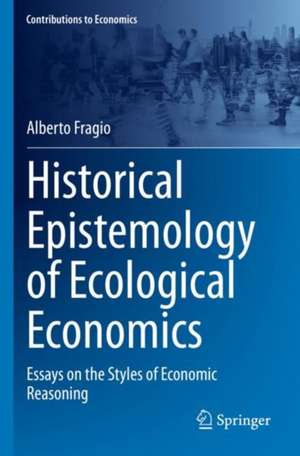Historical Epistemology of Ecological Economics: Essays on the Styles of Economic Reasoning: Contributions to Economics
Autor Alberto Fragioen Limba Engleză Paperback – 7 mar 2023
| Toate formatele și edițiile | Preț | Express |
|---|---|---|
| Paperback (1) | 577.22 lei 6-8 săpt. | |
| Springer International Publishing – 7 mar 2023 | 577.22 lei 6-8 săpt. | |
| Hardback (1) | 583.45 lei 6-8 săpt. | |
| Springer International Publishing – 6 mar 2022 | 583.45 lei 6-8 săpt. |
Din seria Contributions to Economics
- 18%
 Preț: 1001.81 lei
Preț: 1001.81 lei -
 Preț: 90.83 lei
Preț: 90.83 lei - 15%
 Preț: 649.06 lei
Preț: 649.06 lei - 18%
 Preț: 1109.92 lei
Preț: 1109.92 lei - 24%
 Preț: 657.09 lei
Preț: 657.09 lei - 18%
 Preț: 976.54 lei
Preț: 976.54 lei - 17%
 Preț: 361.03 lei
Preț: 361.03 lei - 18%
 Preț: 1027.83 lei
Preț: 1027.83 lei -
 Preț: 283.93 lei
Preț: 283.93 lei - 15%
 Preț: 644.95 lei
Preț: 644.95 lei - 15%
 Preț: 638.24 lei
Preț: 638.24 lei -
 Preț: 394.29 lei
Preț: 394.29 lei - 15%
 Preț: 636.80 lei
Preț: 636.80 lei - 15%
 Preț: 637.78 lei
Preț: 637.78 lei - 18%
 Preț: 723.69 lei
Preț: 723.69 lei - 15%
 Preț: 635.47 lei
Preț: 635.47 lei - 15%
 Preț: 634.00 lei
Preț: 634.00 lei -
 Preț: 392.75 lei
Preț: 392.75 lei -
 Preț: 383.33 lei
Preț: 383.33 lei - 15%
 Preț: 637.28 lei
Preț: 637.28 lei - 15%
 Preț: 636.80 lei
Preț: 636.80 lei - 18%
 Preț: 950.96 lei
Preț: 950.96 lei - 15%
 Preț: 634.68 lei
Preț: 634.68 lei -
 Preț: 387.38 lei
Preț: 387.38 lei - 15%
 Preț: 647.27 lei
Preț: 647.27 lei - 15%
 Preț: 636.63 lei
Preț: 636.63 lei - 15%
 Preț: 639.73 lei
Preț: 639.73 lei -
 Preț: 385.62 lei
Preț: 385.62 lei - 15%
 Preț: 641.85 lei
Preț: 641.85 lei - 20%
 Preț: 649.60 lei
Preț: 649.60 lei - 15%
 Preț: 641.71 lei
Preț: 641.71 lei -
 Preț: 387.96 lei
Preț: 387.96 lei - 15%
 Preț: 645.47 lei
Preț: 645.47 lei -
 Preț: 385.08 lei
Preț: 385.08 lei - 15%
 Preț: 646.62 lei
Preț: 646.62 lei -
 Preț: 383.33 lei
Preț: 383.33 lei - 15%
 Preț: 638.43 lei
Preț: 638.43 lei -
 Preț: 381.21 lei
Preț: 381.21 lei - 15%
 Preț: 642.51 lei
Preț: 642.51 lei - 15%
 Preț: 637.78 lei
Preț: 637.78 lei - 15%
 Preț: 641.71 lei
Preț: 641.71 lei -
 Preț: 384.70 lei
Preț: 384.70 lei -
 Preț: 379.86 lei
Preț: 379.86 lei -
 Preț: 378.34 lei
Preț: 378.34 lei -
 Preț: 384.70 lei
Preț: 384.70 lei -
 Preț: 388.52 lei
Preț: 388.52 lei - 15%
 Preț: 641.71 lei
Preț: 641.71 lei -
 Preț: 381.00 lei
Preț: 381.00 lei - 15%
 Preț: 644.95 lei
Preț: 644.95 lei -
 Preț: 386.00 lei
Preț: 386.00 lei
Preț: 577.22 lei
Preț vechi: 679.08 lei
-15% Nou
Puncte Express: 866
Preț estimativ în valută:
110.49€ • 120.05$ • 92.87£
110.49€ • 120.05$ • 92.87£
Carte tipărită la comandă
Livrare economică 21 aprilie-05 mai
Preluare comenzi: 021 569.72.76
Specificații
ISBN-13: 9783030945886
ISBN-10: 303094588X
Pagini: 139
Ilustrații: XVII, 139 p.
Dimensiuni: 155 x 235 mm
Greutate: 0.23 kg
Ediția:1st ed. 2022
Editura: Springer International Publishing
Colecția Springer
Seria Contributions to Economics
Locul publicării:Cham, Switzerland
ISBN-10: 303094588X
Pagini: 139
Ilustrații: XVII, 139 p.
Dimensiuni: 155 x 235 mm
Greutate: 0.23 kg
Ediția:1st ed. 2022
Editura: Springer International Publishing
Colecția Springer
Seria Contributions to Economics
Locul publicării:Cham, Switzerland
Cuprins
1. Styles of Scientific Reasoning as Historiographical Metaphor: A Reply to Martin Kusch.- 2. The Myth of the Framework and the Modes of Thought in Economics.- 3. Historical Epistemology of Ecological Economics and Styles of Economic Reasoning.- 4. The Crisis of the Historical Style of Economic Reasoning: Joseph A. Schumpeter, Nicholas Georgescu-Roegen, and Paul A. Samuelson.- 5. Fundamental Disagreements in the Origin of Ecological Economics.- 6. Environmental Metaphors of Scarcity.- 7. The Two Chief Epistemic Styles of Mathematical Ecology.- 8. Classical Historical Epistemology in Retrospect: A Review Essay
Notă biografică
Alberto Fragio is full professor in the Department of Humanities at the Universidad Autónoma Metropolitana, Unidad Cuajimalpa, Mexico City. He earned his PhD in Philosophy (2007) from the Universidad Autonoma of Madrid (Spain), and in Cultural Sciences (2011) from Scuola Internazionale di Alti Studi di Modena (Italy). He was holder of a Swiss Government Scholarship at Eidgenössische Technische Hochschule Zürich – Chair for Science Studies (Switzerland), and a Gerda Henkel Stiftung postdoctoral fellowship (Marie Curie Fellowship – M4HUMAN programme) at the Institut für Medizingeschichte und Wissenschaftsforschung der Universität zu Lübeck(Germany). He has been Visiting Scholar in the Department of History of Science at Harvard University (USA), in the Deutsches Literaturarchiv Marbach (Germany), or the Centro de Ciencias Humanas y Sociales del CSIC (Spain), among other institutions. He is a member of the Zentrum für Kulturwissenschaftliche Forschung (ZKFL Lübeck), and the research groupon “Historical Epistemology and History of Experience” at Spanish National Research Council CSIC (Madrid).
Textul de pe ultima copertă
This volume uses historical epistemology to address several topics in the history of economic thought, with special emphasis on ecological economics, environmental metaphors of scarcity, and mathematical ecology. Using the field of ecological economics as an anchor point, the author reflects on the styles of reasoning in economics with a view towards understanding the nature of disagreement that stems from a failure of communication between rival approaches in economics. A thorough inquiry into issues related to identity, coherence, pluralism, and reception, this volume will appeal to researchers and students interested in history of economic thought, ecological economics, and philosophy of the sciences.
Caracteristici
Evaluates the development of ecological economics through historical epistemology Applies Hans Blumenberg’s metaphorology to the history of ecological economics Debates the decline of the historical style of economic reasoning with reference to Schumpeter
